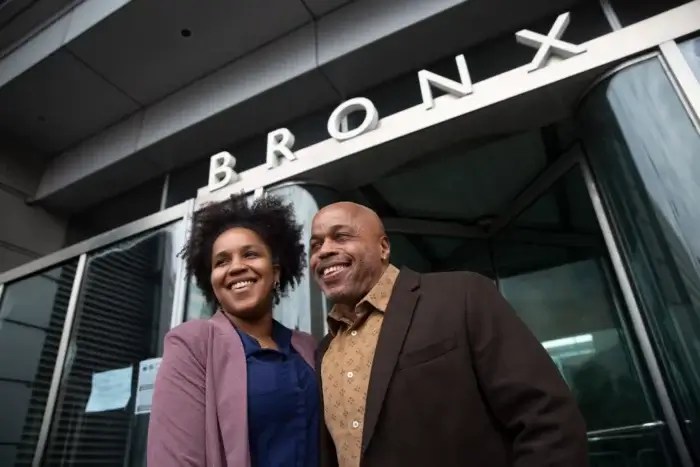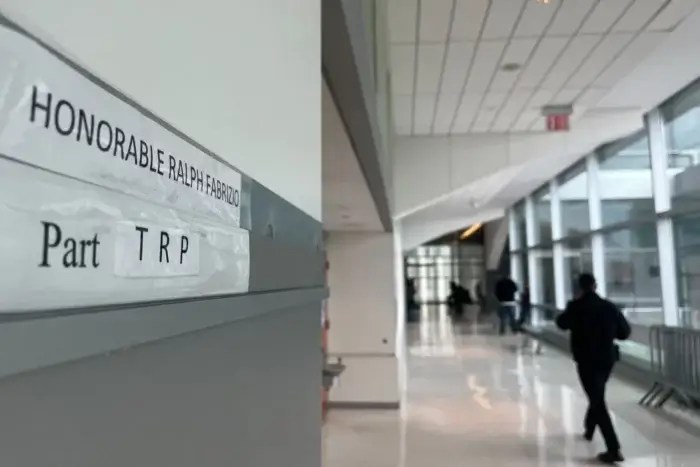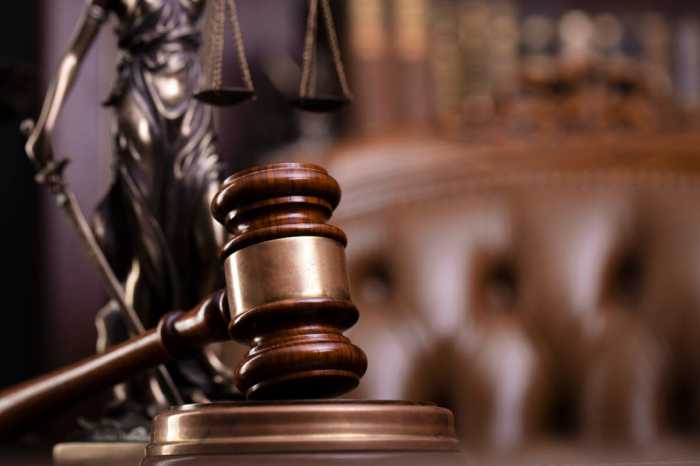“This story was originally published on May 9 by THE CITY. Sign up here to get the latest stories from THE CITY delivered to you each morning.”
This Tuesday morning, Norberto Peets walked out of a Bronx courtroom officially a free man.
Since last September, Peets, who was convicted of attempted murder and gun possession following a 1996 shooting, has lived in an odd judicial limbo — having his conviction vacated, reinstated and now vacated again, this time for good.
“For the last six months that I’ve gone through this, I feel so painful because I thought [it’s] never going to end,” Peets said in an interview outside the courthouse.
At the center of this highly unusual seesaw was Bronx Supreme Court Judge Ralph Fabrizio, who presided over Peets’ recent attempts to get out of prison and clear his name.
Fabrizio, who was first appointed to the judiciary in 2001 by then Mayor Rudolph Giuliani, has also been the subject of complaints dating back to at least 2016 from at least eight defense attorneys and prosecutors, according to interviews and a confidential complaint obtained by THE CITY.
Here’s how Peets’ saga with Fabrizio and the Bronx courts unfolded.
Last September, Fabrizio vacated Peets’ convictions and ordered him a new trial, based on new investigations by his counsel and the Bronx District Attorney’s Office that documented major missteps his original lawyer had made during his trial.
But in January, after the Bronx District Attorney’s Office announced it was not going to retry Peets, the judge unilaterally reinstated the purged convictions, claiming he had failed to read the court record before making his initial decision.
On Tuesday, Fabrizio reversed himself yet again, re-vacating Peets’ convictions and dismissing his original indictment — burying the case for good.
The dramatic turn of events came after Peets’ attorneys asked New York’s appellate division to block Fabrizio’s backtracking — and after THE CITY reached out to the judge for comment about his handling of the Peets’ case as well as about past complaints by at least eight attorneys about his allegedly erratic and abusive behavior on the bench.
Last Wednesday, THE CITY visited Fabrizio’s courtroom and requested an interview, prompting the judge to walk away from his bench and stand in a side room hidden from public view for at least several minutes.
On Monday afternoon, less than three hours after THE CITY sent Fabrizio a detailed set of questions about the Peets’ case and past complaints against him, the judge emailed the Bronx District Attorney’s Office and Peets’ counsel notifying them that he had decided to dismiss the matter. Fabrizio, however, did not respond to THE CITY’s questions.
On Tuesday, Peets’ hearing lasted about a minute. The judge declared the case was dismissed and sealed, and wished the 52 year old man good luck.
“I was waiting for this since I got arrested,” Peets said, recalling the moment when Fabrizio said “case dismissed.” “I know it was going to happen one day. It finally happened today. It’s over. Thank God.”
Judge Fabrizio backtracks
After 26 years behind bars, Peets walked out of his Fishkill, N.Y., prison cell last September about to be a free man — or so his family thought.
That day, Fabrizio released Peets and vacated his convictions for a 1996 shooting, after the Bronx District Attorney’s Office joined his legal team in a motion arguing that his original trial lawyer had failed to obtain critical medical evidence and interview key witnesses that could have bolstered his argument that another man committed the shooting.
“Though it is a new day, my brother faces a long road ahead to rebuild his life,” Peets’ younger brother wrote in a public GoFundMe appeal that November, describing the family’s joy at reuniting with a man, who was locked away from his two young children when he was just 26 years old.
Unlike in many exoneration campaigns, the District Attorney’s Office had actually supported Peets’ attorneys’ motion to vacate the conviction. Both sides agreed that the performance of his original attorney had been so deficient that his constitutional right to the effective assistance of counsel had been violated.
At a hearing on the day of the initial vacatur, Risa Gerson, chief of the Bronx District Attorney’s Office’s Conviction Integrity Bureau, noted that these failures were not mere legal technicalities. She said they undermined the District Attorney’s faith in the validity of the original conviction altogether.
“When counsel does not do his job and investigate cases, investigate medical evidence that can show the defendant was not the person who was the perpetrator, we lose confidence in the reliability of the conviction,” Gerson told the court.
Several weeks later, the Bronx District Attorney’s Office declared it was not going to re-try the 52-year-old, pointing to major problems in the prosecution’s case.
Both sides of the courtroom were ready to let Peets move on with his life — but Fabrizio was not.

In January, in response to the Bronx District Attorney’s attempt to drop the charges, Fabrizio issued an order that legal experts say is almost unheard of: he vacated his own vacation of Peets’ conviction.
“The Court did not review the record,” Fabrizio wrote, accusing Gerson of omitting crucial information in legal filings and complaining that she “never provided” him with a trial transcript.
Fabrizio also chastised Gerson for failing “to correct” Peets’ attorneys’ claims about a key piece of evidence in the case, a bullet fragment that they characterized as being “bloody.”
Peets’ counsel did this, in part, because a detective on the stand affirmed that the fragment had blood on it in Peets’ first trial, which ended in a mistrial.
In his January reversal, however, Fabrizio did not mention this original testimony and seized on the fact that at his second trial the same detective testified in a more circumspect manner, noting that the bullet was coated in a “red substance” consistent with “the color of blood.”
After declaring that his initial ruling was “made based on errors of and omissions of fact,” Fabrizio reinstated Peets’ convictions and called for a new hearing.
That stunning reversal prompted a court petition last month from Peets’ attorneys at the Innocence Project and Paul, Weiss, Rifkind, Wharton & Garrison LLP asking the appellate division to block Fabrizio’s attempt to resurrect the conviction. In the petition, Peets’ counsel disputed Fabrizio’s attempted factual objections and suggested the jurist was exceeding his legal authority because of his own personal feelings.
“Justice Fabrizio’s January Order and March Order appear to be rooted in frustration that the People are not moving to retry Mr. Peets, and that frustration appears to drive his judicial overreach,” they wrote.
Peets was scheduled to have a hearing before Fabrizio later this month. But that hearing was preempted after the judge suddenly informed his counsel on Monday that he was willing to dismiss the case — which happened hours after he faced questions from THE CITY.
After Peets’ case was dismissed in a swift hearing on Tuesday morning, Peets’ daughter Johanil Peets, 29, criticized Fabrizio’s conduct in the case.
“It made no sense for me, for us to keep coming back and forth, and you making a decision based on emotion,” she said, referring to the judge. “Today was probably the first day that he was like relaxed.”
“[He was] just playing with his life because he had the power to do it,” the daughter added.
Peets said he was looking forward to getting to know his two kids and his two grandchildren better.
“I wanted to play ball with my grandson. We started playing ball the other day,” Peets said, grinning as his family members and legal team stood with him outside the Bronx Hall of justice.
Prior complaints
Complaints about Fabrizio’s conduct in the courtroom go back to at least 2016, and they don’t just come from defense lawyers.
In April 2016, a prosecutor submitted a complaint to Bronx District Attorney Darcel Clark accusing Fabrizio of being “verbally abusive,” refusing to allow prosecutors to make “a proper record” during hearings, and “consistently attacking the integrity, ethics, and character” of prosecutors, according to a copy of the complaint obtained by THE CITY.
The complaint included an attachment with accounts of 14 alleged courtroom incidents going back to 2008 from at least six current and former Bronx prosecutors, all of whom claimed that Fabrizio had screamed at or repeatedly interrupted them. Some also claimed he threatened to jail or fine them.
In one case from 2008, an assistant district attorney, unnamed in the memo, claimed that Fabrizio threatened to fine them or hold them in contempt of court over a clerical error that turned out to be the fault of the District Attorney’s support staff.
In another instance from 2014, a female prosecutor, who has since left the office, alleged that Fabrizio subjected her to a 45-minute tirade in which he chewed her out for a plea offer that she had not even come up with herself.
“There’s a culture of some abusive male judges getting away with whatever they want,” the former female prosecutor told THE CITY in an interview, speaking on the condition of anonymity. “He was kind of prosecutor-friendly. So if you could tolerate the abuse, ultimately he would rule in your favor.”

Fabrizio’s conduct, the complaint argued, raised the possibility that the jurist had violated the courts’ judicial conduct rules, which hold that judges “shall be patient, dignified, and courteous” to attorneys and must accord attorneys “the right to be heard according to law.”
By 2020, the Bronx prosecutor who had filed the original complaint internally had left the office and did not feel any change had come from his complaint. So that year, the former prosecutor submitted another complaint and the original attachment with the 14 alleged courtroom incidents to the New York State Commission on Judicial Conduct.
In the new complaint, the former prosecutor recounted a conversation with Clark’s then-counsel Joseph Dawson, a former judge, after submitting the memo internally.
“During our meeting, after relaying my concerns, Judge Dawson stated in sum and substance: ‘I’ve known Ralph for a very long time. We used to work together in the Manhattan DA’s office. He’s a good guy. He just has a bit of a temper.’ When I asked if anything was going to be done about this apparent long-standing and widespread pattern of abusive conduct, Judge Dawson said that he would speak to the DA about it.
I never heard anything about it again.”
Dawson did not respond to requests for comment.
The complaint included five named current and former prosecutors and was addressed to Clark herself as the district attorney. Even so, a spokesperson for Clark, Patrice O’Shaugnnessy, said the office was unable to identify the “relevant materials” from the former prosecutor. (Prior to becoming district attorney, Clark served alongside Fabrizio for several years as a judge in Bronx Supreme Court.)
In a statement, a spokesperson for the New York Commission on Judicial Conduct, the state’s official judicial watchdog, noted that “no public disciplinary action has been taken with respect to Judge Fabrizio.”
In recent months, at least one other authority was looking into Fabrizio. Around January, a public defender in the Bronx told THE CITY that she met with Cosmas Grant, an investigator for the Office of Court Administration’s Inspector General, who interviewed her in an office in downtown Manhattan about Fabrizio, following up on what he said was an anonymous complaint.
The Bronx public defender said she told the inspector general’s office that she had witnessed Fabrizio storming off the bench in the middle of court arguments and remanding a defendant to Rikers Island after he refused to take a plea deal.
“I told him that he acts crazy all the time, that he doesn’t listen. He acts erratic,” she said, recalling the interview. “You never know who you’re dealing with. You never know what’s going on.”
Grant hung up on THE CITY when asked for comment in a phone call.
In a statement, Lucian Chalfen, a spokesperson for the court system, declined to provide information about the apparent probe.
“Inspector General investigations are confidential,” he said. “Unless there is a finding or the allegation is substantiated, we do not discuss whether or not there was an investigation or complaint made.”
In light of the complaints, Oded Oren, a former Bronx Defenders staff attorney and founder of Scrutinize, a judicial accountability organization, called on court authorities to take immediate action.
“Based on the allegations of repeated, abusive behavior and improper conduct, OCA administrators should immediately remove Judge Fabrizio from the position of Acting Supreme Court Justice,” he said, noting that Fabrizio was not elected to the position and that court administrators could return him to his previous position in criminal court, which handles misdemeanor cases.
But some courthouse sources told THE CITY they want Fabrizio to stay where he is, arguing that his approach helps cases progress.
“Certainly there are attorneys, defenders and ADAs, who would be happy if he was gone,” said a current Bronx prosecutor who spoke on the condition of anonymity. “But I don’t think that would be best for the criminal justice system. Because of the fear people have of him, he does actually move the calendar.”























